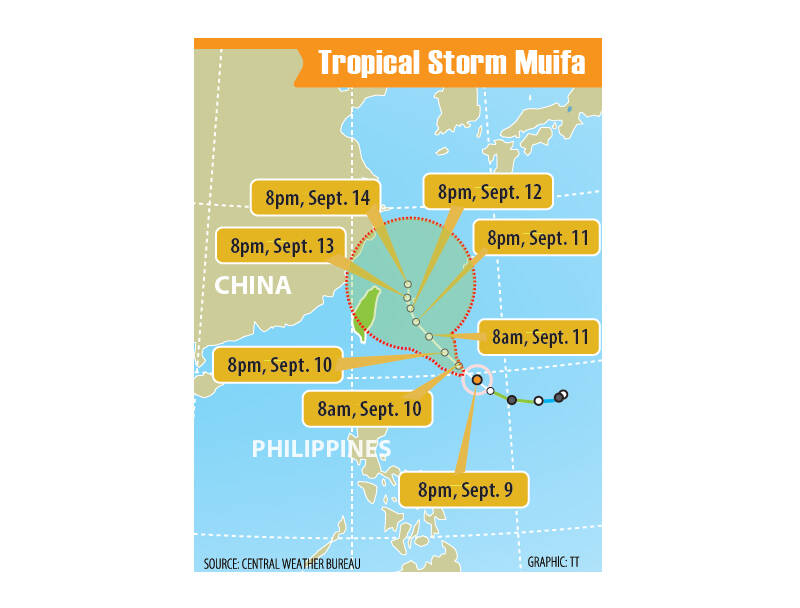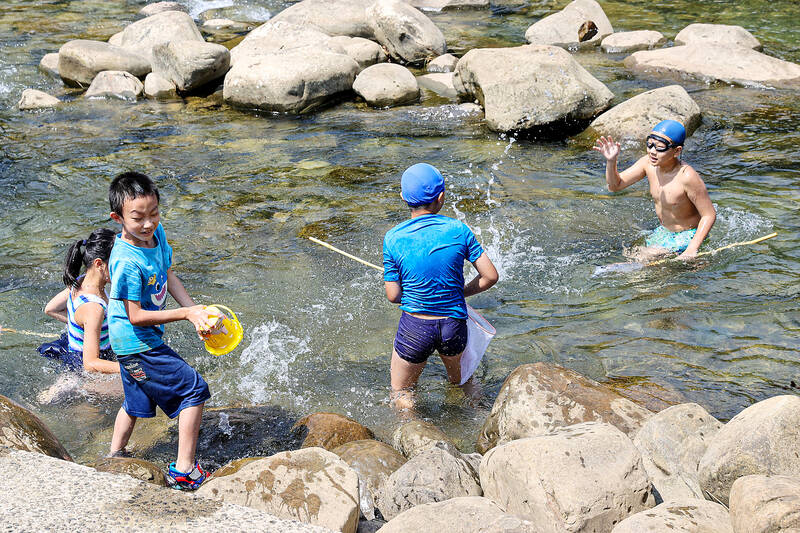A sea warning is likely to be issued tomorrow or Monday for Tropical Storm Muifa, which has been picking up strength and is likely to develop into a typhoon, the Central Weather Bureau (CWB) said yesterday, backtracking on a forecast a day earlier that said a sea warning was unlikely.
At 8am yesterday, the tropical storm was 1,010km southeast of Oluanpi (鵝鑾鼻), Taiwan’s southernmost point, the bureau said.
The storm is expected to slow down starting tomorrow and linger in waters off eastern Taiwan due to a lack of air currents steering it, making a path difficult to predict, it said.

The storm is expected to travel just south of Japan’s Ryukyu Islands and then veer north toward Ishigaki by about Wednesday, it said.
Bureau forecaster Chang Cheng-chuan (張承傳) said there was a high probability that a sea warning would be issued, but was not yet sure whether a land warning would be necessary.
Muifa’s periphery could bring heavy rain to eastern and northeastern Taiwan, and the northern coast, Chang said.

Photo: CNA
Wu Der-rong (吳德榮), an associate professor of atmospheric sciences at National Central University, said forecasts he conducted using two different methods both showed that Muifa would move in a northwesterly direction and would linger in waters east of Taiwan, but complex atmospheric conditions meant it was impossible to be certain about anything except the general direction it was headed.
CWB forecasts show that the storm could develop into a typhoon, Wu said, adding that there were too many uncertainties to rule out the possibility of adverse weather effects on Taiwan.
Yesterday’s sunny weather is likely to continue into today, the CWB said, although residents of northern and eastern Taiwan should expect brief and localized showers from this evening to Wednesday.

LOOKING NORTH: The base would enhance the military’s awareness of activities in the Bashi Channel, which China Coast Guard ships have been frequenting, an expert said The Philippine Navy on Thursday last week inaugurated a forward operating base in the country’s northern most province of Batanes, which at 185km from Taiwan would be strategically important in a military conflict in the Taiwan Strait. The Philippine Daily Inquirer quoted Northern Luzon Command Commander Lieutenant General Fernyl Buca as saying that the base in Mahatao would bolster the country’s northern defenses and response capabilities. The base is also a response to the “irregular presence this month of armed” of China Coast Guard vessels frequenting the Bashi Channel in the Luzon Strait just south of Taiwan, the paper reported, citing a

A total lunar eclipse, an astronomical event often referred to as a “blood moon,” would be visible to sky watchers in Taiwan starting just before midnight on Sunday night, the Taipei Astronomical Museum said. The phenomenon is also called “blood moon” due to the reddish-orange hue it takes on as the Earth passes directly between the sun and the moon, completely blocking direct sunlight from reaching the lunar surface. The only light is refracted by the Earth’s atmosphere, and its red wavelengths are bent toward the moon, illuminating it in a dramatic crimson light. Describing the event as the most important astronomical phenomenon

Three batches of banana sauce imported from the Philippines were intercepted at the border after they were found to contain the banned industrial dye Orange G, the Food and Drug Administration (FDA) said yesterday. From today through Sept. 2 next year, all seasoning sauces from the Philippines are to be subject to the FDA’s strictest border inspection, meaning 100 percent testing for illegal dyes before entry is allowed, it said in a statement. Orange G is an industrial coloring agent that is not permitted for food use in Taiwan or internationally, said Cheng Wei-chih (鄭維智), head of the FDA’s Northern Center for

UNDER PRESSURE: The report cited numerous events that have happened this year to show increased coercion from China, such as military drills and legal threats The Chinese Communist Party (CCP) aims to reinforce its “one China” principle and the idea that Taiwan belongs to the People’s Republic of China by hosting celebratory events this year for the 80th anniversary of the end of World War II, the “retrocession” of Taiwan and the establishment of the UN, the Mainland Affairs Council (MAC) said in its latest report to the Legislative Yuan. Taking advantage of the significant anniversaries, Chinese officials are attempting to assert China’s sovereignty over Taiwan through interviews with international news media and cross-strait exchange events, the report said. Beijing intends to reinforce its “one China” principle